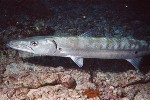|
Photos: I never try to photograph the napoleon wrasse, because it gets away within 5 to 10 meters, so the picture would not reflect its size. Exceptionally, I saw one coming back to the reef towards me. He turned 5 meters from me, which finally enabled me to take a picture. The same goes with barracudas. I had seen beautiful schools but didn't have my camera yet, and despaired to see one each time I went to a Barracuda Point. I saw a few solitary ones, but often too far for it to be worth it. Rare circumstance, I saw one resting, being cleaned by a cleaner wrasse. I managed to get closer, sneak behind a coral boulder to take a closer shot, fascinated by its massive jaw. It then left when the other divers approached.. Description: The napoleon wrasse is one of the biggest fish one encounters during a dive. It is not rare to meet one, often swimming on its own close to the coral and not too deep. It rarely allows less than 5-10 meters distance, although human presence doesn't disturb it too much. It's especially impressive because it is very tall, and not only long. Not to be confused with the bumphead parrotfish than can grow up to 1.5 meters but move in groups and have a much bigger bump on the head. I also came across an amazing maori wrass in the Whitsunday Islands. As it was used to humans, I manage to skin dive and swim along side it with my hand barely on its side. The barracuda is quite a famous and feared fish, due to the solitary attacks in the Caribbeans. Fearsome on its own as a full-grown adult, it is more often seen when it is juvenile in groups, circling near the reef. It goes solo when it's big enought, and is quite impressive then. One can observe it cruising quickly near the coral, not letting anyone get very close. When there are fish schools in strong currents, one can spot out the elusive presence of this top of the food chain animal. Type | Max size | Habitat - Depth - Rareness - N/D- Comments | N | Napoleon wrasse | 2.3m | Above the coral, 5-15m, not rare, diurnal, doesn't let one get too close | J | Barracuda | 2-3m ? | Above the coral, 5-25m, not rare, diurnal, avoids humans apart from when in schools | K |
|
|



